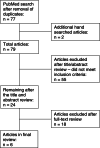Information and communication technology to enhance continuing professional development (CPD) and continuing medical education (CME) for Rwanda: a scoping review of reviews
- PMID: 33926419
- PMCID: PMC8081763
- DOI: 10.1186/s12909-021-02607-w
Information and communication technology to enhance continuing professional development (CPD) and continuing medical education (CME) for Rwanda: a scoping review of reviews
Abstract
Background: Access to high quality continuing professional development (CPD) is necessary for healthcare professionals to retain competency within the ever-evolving worlds of medicine and health. Most low- and middle-income countries, including Rwanda, have a critical shortage of healthcare professionals and limited access to CPD opportunities. This study scoped the literature using review articles related to the use of information and communication technology (ICT) and video conferencing for the delivery of CPD to healthcare professionals. The goal was to inform decision-makers of relevant and suitable approaches for a low-income country such as Rwanda.
Methods: PubMed and hand searching was used. Only review articles written in English, published between 2010 and 2019, and reporting the use of ICT for CPD were included.
Results: Six review articles were included in this study. Various delivery modes (face to face, pure elearning and blended learning) and technology approaches (Internet-based and non-Internet based) were reported. All types of technology approach enhanced knowledge, skills and attitudes. Pure elearning is comparable to face-to-face delivery and better than 'no intervention', and blended learning showed mixed results compared to traditional face-to-face learning. Participant satisfaction was attributed to ease of use, easy access and interactive content.
Conclusion: The use of technology to enhance CPD delivery is acceptable with most technology approaches improving knowledge, skills and attitude. For the intervention to work effectively, CPD courses must be well designed: needs-based, based on sound educational theories, interactive, easy to access, and affordable. Participants must possess the required devices and technological literacy.
Keywords: Continuing medical education (CME); Continuing professional development (CPD); Developing Countries; Information and communications technology (ICT); Rwanda; Technology enabled and enhanced teaching (TEET); lifelong learning.
Conflict of interest statement
The author(s) declare that they have no financial or personal relationship(s) that may have inappropriately influenced them in writing this article.
Similar articles
-
Online learning for continuous professional development of healthcare workers: an exploratory study on perceptions of healthcare managers in Rwanda.BMC Med Educ. 2022 Dec 8;22(1):851. doi: 10.1186/s12909-022-03938-y. BMC Med Educ. 2022. PMID: 36482342 Free PMC article.
-
The effectiveness of internet-based e-learning on clinician behavior and patient outcomes: a systematic review protocol.JBI Database System Rev Implement Rep. 2015 Jan;13(1):52-64. doi: 10.11124/jbisrir-2015-1919. JBI Database System Rev Implement Rep. 2015. PMID: 26447007
-
An Approach to the Design and Development of an Accredited Continuing Professional Development e-Learning Module on Virtual Care.JMIR Med Educ. 2024 Aug 8;10:e52906. doi: 10.2196/52906. JMIR Med Educ. 2024. PMID: 39119741 Free PMC article.
-
A scoping review of continuing education models and statutory requirements for pharmacists globally.BMC Med Educ. 2024 Mar 27;24(1):343. doi: 10.1186/s12909-024-05322-4. BMC Med Educ. 2024. PMID: 38539186 Free PMC article.
-
Continuing professional development (CPD) system development, implementation, evaluation and sustainability for healthcare professionals in low- and lower-middle-income countries: a rapid scoping review.BMC Med Educ. 2023 Jul 6;23(1):498. doi: 10.1186/s12909-023-04427-6. BMC Med Educ. 2023. PMID: 37415150 Free PMC article.
Cited by
-
Utilization of continuous professional development among health professionals in East Ethiopia: a multi-health facility-based cross-sectional study.BMC Med Educ. 2024 Jan 12;24(1):61. doi: 10.1186/s12909-024-05036-7. BMC Med Educ. 2024. PMID: 38216906 Free PMC article.
-
Online learning for continuous professional development of healthcare workers: an exploratory study on perceptions of healthcare managers in Rwanda.BMC Med Educ. 2022 Dec 8;22(1):851. doi: 10.1186/s12909-022-03938-y. BMC Med Educ. 2022. PMID: 36482342 Free PMC article.
-
Building an interdisciplinary workforce for prevention and control of non-communicable diseases: the role of e-learning.BMJ. 2023 May 23;381:e071071. doi: 10.1136/bmj-2022-071071. BMJ. 2023. PMID: 37220940 Free PMC article.
-
Doctors' engagement with a formal system of continuing professional development in Ireland: a qualitative study in perceived benefits, barriers and potential improvements.BMJ Open. 2021 Nov 24;11(11):e049204. doi: 10.1136/bmjopen-2021-049204. BMJ Open. 2021. PMID: 34819279 Free PMC article.
-
Assessing Knowledge, Competence, and Performance Following Web-Based Education on Early Breast Cancer Management: Health Care Professional Questionnaire Study and Anonymized Patient Records Analysis.JMIR Form Res. 2024 Mar 21;8:e50931. doi: 10.2196/50931. JMIR Form Res. 2024. PMID: 38512328 Free PMC article.
References
-
- European Commission . Making a European area of lifelong learning a reality. 2001.
-
- Srivastava V, Sullivan L, Sanghvi S, et al. CME/CPD in the Indian Subcontinent: Proceedings from the 1st regional meeting of Global Alliance for Medical Education (GAME) in Mumbai, India. J Eur C. 2015;4(1):27499. 10.3402/jecme.v4.27499.
Publication types
MeSH terms
Grants and funding
LinkOut - more resources
Full Text Sources
Other Literature Sources


